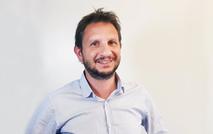CHF 10,000 each from Venture Kick for startups developing crop protecting drones, a chemical recycling technology for plastics, a platform to find the right treatment for cancer, and a sustainable energy system
04.09.2019
Venture Kick’s jury selected ecoresponsible drone company Aero41 developing drones for crop protection, Depoly closing the loop on PET recycling via a chemical recycling technology for plastics, Swiss Medical Union leveraging an ex-vivo platform to predict individual in vivo results via a micro- bioreactor and simulation software, and Sympheny's platform helping the master planners of local energy systems.
.jpg) |
 Aero41 Co-founder and CEO Frédéric Hemmeler
|
 Depoly's founder Samantha Anderson
|
 Swiss Medical Union's CMO Argi Marion
|
 Sympheny's CEO Andrew Bollinger
|
Aero41: Swiss precision for plant protection via ecological drones
HES SO-Wallis graduate Frederic Hemmeler , co-founder and CEO of Aero41 brings together the team of European pioneers in the development of drones dedicated to crop protection and high-capacity chassis. They developed the first crop protection drone approved for "ground application" in Switzerland. On April 15, 2019, they passed through Agroscope's test benches in Tänikon to have their AGv1 approved as a "ground treatment means".
www.aero41.ch
Depoly: Closing the loop on PET recycling
Samantha Anderson founded Depoly as an EPFL spin-off developing chemical recycling technology for plastics. The innovation of this project lies in the process developed to depolymerize PET or other ester based plastics without the use of heat, or pressure. All the materials are non-toxic, abundant and commercially available, and can be regenerated using existing technology. The initial financing (10,000 CHF) provided by Venture Kick will be used towards developing a professional website, as well as to help pay for a part-time engineer to aid in the installment of their first small scale pilot plant.
www.depoly.ch
Swiss Medical Union: Finding the right treatment for cancer patients avoiding test on animals
Current in-vivo testing via animal and human studies is expensive and lengthy – predictions to individual patient results are impossible. Especially, Cancer patients are being treated with several different Chemo-Therapies until responding to one treatment. Swiss Medical Union team, Daniil Golubev - CEO & Founder, Marion Argi – CMO and Andrew Alikimovitch, CTO from the University of Geneva (UNIGE) is leveraging an ex-vivo platform to predict individual in vivo results via a micro- bioreactor and simulation software. The goal of this platform is to increase the efficiency and speed of finding the appropriate treatment for the patient without having to try it on an animal or the patient himself, avoiding all the negative consequences that might arise should the drug be the wrong one. Currently they have the prototypes and are about to start the testing session in Germany. the Swiss testing will start within the next couple of months. The Venture Kick funds will be used to get the CE Mark for Bioreactor & Test, a clinical evaluation and an Adaptation of Bioreactor from minimum viable product to full product.
https://medicalunion.swiss/
Sympheny: Planning resilient and sustainable local energy systems
The process of local energy planning is becoming increasingly data-intensive and complex. Andrew Bollinger (CEO), Julien Marquant, and Boran Morvaj are leading the realization of the EMPA spin-off Sympheny. Sympheny’s main product will be a SaaS platform offering a unique synthesis of intelligent analytics, intuitive interfaces and diverse data streams. Their goal is to help the master planners of local energy systems (engineering firms and local utilities) to quickly, comprehensively and effectively navigate the range of available technology options for a given site, and to identify the optimal energy supply solution considering objectives such as costs or sustainability. Sympheny’s main source of revenue will be software subscriptions. Its core technology has, over the past year, been tested and validated in intensive projects with industry partners such as Regionalwerke Baden, St. Galler Stadtwerke, Lauber Iwisa and Stadt Zurich.
http://sympheny.com/
HES SO-Wallis graduate Frederic Hemmeler , co-founder and CEO of Aero41 brings together the team of European pioneers in the development of drones dedicated to crop protection and high-capacity chassis. They developed the first crop protection drone approved for "ground application" in Switzerland. On April 15, 2019, they passed through Agroscope's test benches in Tänikon to have their AGv1 approved as a "ground treatment means".
www.aero41.ch
Depoly: Closing the loop on PET recycling
Samantha Anderson founded Depoly as an EPFL spin-off developing chemical recycling technology for plastics. The innovation of this project lies in the process developed to depolymerize PET or other ester based plastics without the use of heat, or pressure. All the materials are non-toxic, abundant and commercially available, and can be regenerated using existing technology. The initial financing (10,000 CHF) provided by Venture Kick will be used towards developing a professional website, as well as to help pay for a part-time engineer to aid in the installment of their first small scale pilot plant.
www.depoly.ch
Swiss Medical Union: Finding the right treatment for cancer patients avoiding test on animals
Current in-vivo testing via animal and human studies is expensive and lengthy – predictions to individual patient results are impossible. Especially, Cancer patients are being treated with several different Chemo-Therapies until responding to one treatment. Swiss Medical Union team, Daniil Golubev - CEO & Founder, Marion Argi – CMO and Andrew Alikimovitch, CTO from the University of Geneva (UNIGE) is leveraging an ex-vivo platform to predict individual in vivo results via a micro- bioreactor and simulation software. The goal of this platform is to increase the efficiency and speed of finding the appropriate treatment for the patient without having to try it on an animal or the patient himself, avoiding all the negative consequences that might arise should the drug be the wrong one. Currently they have the prototypes and are about to start the testing session in Germany. the Swiss testing will start within the next couple of months. The Venture Kick funds will be used to get the CE Mark for Bioreactor & Test, a clinical evaluation and an Adaptation of Bioreactor from minimum viable product to full product.
https://medicalunion.swiss/
Sympheny: Planning resilient and sustainable local energy systems
The process of local energy planning is becoming increasingly data-intensive and complex. Andrew Bollinger (CEO), Julien Marquant, and Boran Morvaj are leading the realization of the EMPA spin-off Sympheny. Sympheny’s main product will be a SaaS platform offering a unique synthesis of intelligent analytics, intuitive interfaces and diverse data streams. Their goal is to help the master planners of local energy systems (engineering firms and local utilities) to quickly, comprehensively and effectively navigate the range of available technology options for a given site, and to identify the optimal energy supply solution considering objectives such as costs or sustainability. Sympheny’s main source of revenue will be software subscriptions. Its core technology has, over the past year, been tested and validated in intensive projects with industry partners such as Regionalwerke Baden, St. Galler Stadtwerke, Lauber Iwisa and Stadt Zurich.
http://sympheny.com/


